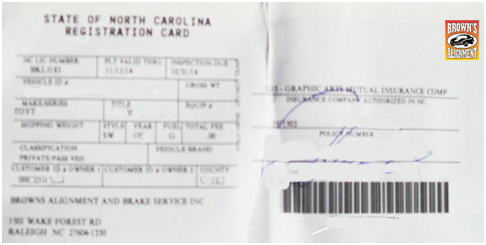What is a North Carolina state inspection?
Before renewing a vehicle registration in North Carolina, your vehicle must undergo an annual safety inspection at a licensed state inspection station. In 19 counties, vehicles must also pass an emissions inspection. The emissions inspection is conducted at the same time as the safety inspection. To pass the emissions inspection, the check engine light must illuminate when the car is powered on/started but cannot stay on as this indicates an emissions-related malfunction. For safety only inspections, the check engine light must work, but does not have to be off to pass inspection.
If a vehicle is not inspected by the due date, registration will be blocked until the inspection is completed.
When should I get a North Carolina state inspection?
Your vehicle must have a state inspection no more than 90 days before the license plate and registration expire. The inspection must be completed before you pay your vehicle registration fees. The state will not process your payment and renew your license tag until your vehicle has successfully completed a safety inspection. If an emissions inspection is also required, you won’t be able to renew your registration until your vehicle passes or you obtain an emissions waiver.
How much does a North Carolina state inspection cost?
State inspection cost is regulated by law and auto shops cannot charge more than the maximum fees set by the state of North Carolina.
- Safety & Emissions Inspection = $30.00 (23.75 labor + 6.25 e-sticker fee)
- Safety Inspection = $13.60 ($12.75 + .85 cents e-sticker fee)
- Window Tint Fee (if applicable) = $10

How is an emissions inspection performed?
During an emissions inspection, a certified analyzer is connected to the vehicle’s OBDII system. The analyzer will confirm the proper functioning of all emissions components and systems according to manufacturer specifications. Additionally, a visual safety and tamper inspection is conducted.
How is a safety inspection performed?
During a safety inspection, a licensed mechanic examines a vehicle’s:
Will my car pass NC state inspection if the check engine light is on?
If an emissions inspection is required for your vehicle, it will not pass with the check engine light on. You must have the problem repaired and have the vehicle re-inspected once the check engine light is no longer on. Alternatively, you may seek an emissions waiver from the North Carolina DMV. (See the section below with instructions on how to obtain an emissions waiver)
Vehicles that are subject to safety only inspections will not fail if the check engine light is on at the time of inspection.
How can I get an emissions inspection waiver?
The process for obtaining an emissions waiver from NC DMV is as follows:
1. Vehicle fails state emissions inspection
2. Provide DMV with documentation of $200 or more spent for repairs related to why the vehicle failed
3. Vehicle fails emissions inspection again after the above repairs are completed
4. Bring the vehicle and all supporting documentation to a License & Theft Bureau to obtain a repair waiver. All safety items must successfully pass inspection. A waiver cannot be granted for failure of any portion of the safety inspection. If an emissions waiver is granted, DMV will issue a waiver authorization number.
5. Present the inspection station with the waiver authorization number. An inspection mechanic will then be able to complete the inspection.
NOTE: The emissions waiver is good for one year after it is issued. If the reason for emissions failure is not repaired, you will be required to obtain a new waiver every year before your vehicle can successfully complete the emissions portion of the inspection.
